- Home
- Martin Cruz Smith
Stalin's Ghost Page 14
Stalin's Ghost Read online
Page 14
With two minutes to go, Zhenya went into action. It wasn’t so much the development of black pieces that was extraordinary as the rapidity with which he met white’s every move. White would advance a piece and hardly hit the time button when black did the same, so that the clicks of the buttons came in pairs and the enormous time advantage white had for his moves came to seem pointless, even ridiculous. He began to play at Zhenya’s pace, conceding doubled pawns for a promising queenside push. He traded pieces at a slight disadvantage, saw the queenside attack fade, was stampeded into a high-speed exchange that cleared the board and, stripped, watched as a black pawn strolled to promotion. Cameras, guests and finished players watched as the white king dropped. The loser sank into his chair, still confused. It was the sort of loss that could kill a game for a man, Arkady thought. Zhenya looked for the next opponent.
Platonov’s verdict in the van was, “Nothing but tricks. If you let Zhenya set the rhythm, of course he’ll overwhelm you. In blitz you don’t play with your head. There’s no time to think. You play with your hands and the little shit has very fast hands. But now everyone knows how strong he is. Vanity will be his downfall.”
Zhenya’s second opponent was the prodigy. Perched on his booster seat the boy leveled an unblinking gaze at Zhenya, who had picked his fingernails during intermission. The producer ate it up.
“Two boys from different planets and neither of them Earth. Get tighter.”
When the prodigy won the coin toss, the camera closed in on a smile trying to hide in a corner of his lips. He had the voice of a choir soprano. “White, please.”
Playing black again, Zhenya answered from the start, simply countering and developing his pieces, castling, leaving no obvious weaknesses and mounting no clear attack. Trench warfare. He was even in material until the prodigy did to Zhenya what Zhenya had done to his first opponent and lumbered him with doubled pawns, the first chink in black’s defense. It had promise. Trying to protect his men Zhenya lost offense, and no offense made for an overburdened defense. Targets started to appear. It was so hard to choose, the prodigy squirmed in his seat. It wasn’t until he was down to fifteen seconds on his clock that he realized Zhenya had almost a full minute left on his. At which point, black unveiled a long diagonal across the board and a pin on white’s queen. Not a serious pin, not one that couldn’t be refuted with no more than two or three minutes of analysis. The prodigy’s hand hovered. It was still in the air when his clock said 0:00.
Platonov sneered. “Some victory. He fooled a baby. He managed time better than an opponent who could barely see over the chessboard.”
“It’s down to four players,” Arkady said.
“I never said he wasn’t talented. I said he was wasting his talent. He only plays for money and this, this, this is the proof. In a casino. Look at him.” Platonov pointed to the television screen. Zhenya had pulled up his hood, as good as hiding his face. “He thinks he’s Bobby Fischer.”
During the intermission, a girl Zhenya’s age dared to break into Zhenya’s solitude to offer him a stick of gum the careful way someone feeds a half-wild animal. When the intermission was over she stayed in the player’s seat opposite him and he chewed more thoughtfully.
Playing black, she immediately challenged Zhenya for control of the center of the board. Her style was as cold-blooded as his, sacrificing a pawn to gain tempo and reach level ground with white. Blitz was a sprint and it was hard to distinguish the beginning from the middle game and the middle game from the end. Forty moves in five minutes. No draws. On the other board still in action—the university champion versus a grizzled veteran—the need for speed encouraged exchanges for simplification’s sake. In contrast, Zhenya and the girl developed an intricate structure of poison pawns, veiled threats and phantom attacks. The slightest push could bring it all down. She studied the board with a penetrating gaze. Zhenya closed his eyes. He liked to play blindfolded; Arkady had seen him do it many times. In his mind, Zhenya once told him, he saw all the variations in three dimensions. Not analyzed. Saw.
Zhenya opened his eyes. He pushed. Starting equal in material, he and the girl machine-gunned the board for the next five moves, ending in positions that were identical with one exception: she attacking his king with a bishop while he attacked hers with a knight. A bishop had more sweep than a knight, but a knight jumped enemy lines and in crowded quarters that was the edge.
She saw it. “Mate in five,” she said and set her king on its side.
“The girl has possibilities,” Platonov said.
“We have our finalists!” the presenter announced. “Moscow University undergraduate champion Tomashevsky and our tournament surprise.”
“What did you think of Zhenya’s game?” Arkady asked.
“What did you think?” Platonov threw the question back. “You’ve wondered for days what he’s been doing. He’s been preparing.”
Lydia pulled Tomashevsky and Zhenya in front of the camera and asked what they would do with a thousand dollars if they won.
“Buy a new road bike,” Tomashevsky said. He looked athletic. “And beer.”
“And you?” Lydia asked Zhenya.
“A tricycle,” suggested Tomashevsky.
Zhenya said nothing. He looked at a cage of gaudy parrots that huddled together and blinked their leathery eyelids.
“It must be a secret,” the presenter let him off the hook.
“This is the truth about chess,” Platonov said. “People don’t win a match, they lose. They find a way to lose. Chess is one choice after another and people get tired of choosing. The body gets tired and the brain gives in. The brain says, what are you doing here pulling your wad when you could be out in the midst of life, with women and song and good champagne?”
“How do you think the university champion will do?” Arkady asked.
“Against Zhenya? He doesn’t stand a chance.”
Platonov was right. The game was an anticlimax. Although they played under the overhead camera, the finalists revealed no original or interesting strategy. Television viewers watched the systematic demolition of a university scholar by a boy who did nothing but rapidly offer him choices, one after another. With each wrong choice the scholar’s position deteriorated a little bit. After twenty moves he was only down a pawn but he had nowhere to go. Every move involved some small loss. He was bound by invisible knots that tightened with resistance because he saw that with every succeeding move his situation would be more obvious. Before his friends and admirers. Professors. On television. He did the only rational thing and moved the same piece twice.
“A double move, disqualified!” said the producer, Platonov, all the players and half the people in the gaming hall.
“What a shame,” said the presenter. “The match is decided by a disqualification, a mistake on the part of Tomashevsky, accidentally handing the match to his opponent, Evgeny Lysenko. What a terrible way to lose the tournament when he was doing so well.”
The student Tomashevsky rose from his chair in disbelief, like a man betrayed by nothing more than eagerness and stunned by the magnitude of his error. He’d gotten ahead of himself was all. It happened to the best players and there was nothing to do but be a good sport, although when he offered his hand to Zhenya the boy regarded him with contempt.
“Anyway, we have a champion.” The presenter tried to be bright. “And, fortunately, we also have a bonus match between young Evgeny Lysenko and Grandmaster Ilya Platonov.”
“Are you all right?” Arkady asked.
“A little lightheadedness,” Platonov said. “Have you got a smoke?”
Arkady accompanied him out of the van into the cold bite of a wind that drove flakes across curlicues of ice. Both men sucked fiercely on their cigarettes.
“It’s not a tournament that Zhenya prepared for,” Platonov said. “There was never any doubt about the tournament.”
At the club door, the security squad waved and called Platonov’s name.
“They’re wai
ting for you.”
“It’s hard to explain to someone who is not a player,” Platonov said. “There is a time in your life when you imagine chess so perfectly that your intuition is as solid as any game from any book. Like music, if you can hear the entire suite in one moment. You may seem to move your pieces in a hurry but you’re simply following a score. And then one day this magical ear disappears and you find yourself hawking chess sets to schoolboys for a living. Or worse.” The door of the television van popped open, and the producer yelled for Platonov to move inside the club. Platonov hunched his shoulders. “One day it’s just gone.”
Platonov played white. Between the parking lot and the chessboard he seemed to have found his usual arrogance and wrapped it around himself like a cape. In rapid moves he sacrificed three pawns, opened up the center and developed his pieces while black was still digesting its easy prizes. For the first time since the opening round, Zhenya seemed surprised. Arkady stood in the shadow of a column, out of the boy’s line of sight, and followed the game on a screen from the overhead camera. If Arkady had expected the old man to play it safe and eke out a win he was wrong. Platonov had given Zhenya a huge material advantage. On the other hand, Zhenya’s power pieces hadn’t moved, while the grandmaster’s bishops and knights were already on the battlefield. It was an assault that was too reckless for chess. It was pure blitz.
Zhenya rested his chin in his hand and, with the calm of a young gargoyle at a height, looked down on the pieces on the board. Arkady tried to imagine what it would be like to see the game as Zhenya must. The bishop slyly insinuating himself on the diagonal, the knight leaping barricades, the queen a diva, the king anxious and nearly useless. Or was that too romantic? Did Zhenya see the game merely in bytes, like a computer?
Zhenya pushed his forward pawn closer to the fray, a provocation, and the assault began. As fast as they could hit the clock, Platonov attacked and Zhenya defended. They shuttled pieces in, snatched prizes out, castled under pressure, offered and declined gambits. The thought process could not have been involved, Arkady thought; reason wasn’t enough. This was tempo, pressure, intuition. The shape of the board changed and changed again. Even on the club’s large game screen it was hard to follow the game’s ebb and flow, and just when Arkady expected the entire match would be over in less than a minute Platonov paused to assess the damage. Half the pieces were off the board and somehow, as if Zhenya had reshuffled a deck of cards, the situation was reversed. Platonov had an extra pawn and Zhenya, on the strength of doubled rooks, controlled the center.
Seconds went by. Platonov looked like a man trying to hold a gate closed against a greater force. Arkady wondered whether the grandmaster was trying to find, in the hundred thousand games stored in his mind, a similar position. His precious pawn was an isolated pawn but it was his only winning chance and he assigned a rook to protect it, which opened a hole that Zhenya’s knight immediately filled. Platonov covered up like a hedgehog, which was effective in chess. Blitz, however, was not meant for hedgehogs because moves had to be made at once, at once, at once. He fended off one threat after another and, at the same time, nursed his pawn toward the eighth rank and possible transformation into a second queen. The black king took up the hunt, angling across open squares toward the pawn. The white king was smothered by its own defenses.
While Platonov paused again someone sneezed and Zhenya glanced at the rows of seated spectators. He drew his head in between his shoulders and looked again. The grandmaster was still studying the board when Zhenya laid down the black king.
Platonov was astonished. “What are you doing? You have the advantage.”
“I counted moves. You’d win.”
The teacher in Platonov was outraged. “You counted wrong. How could you do that?”
“You win.”
“Hit me,” said a parrot.
The television van was gone. The tournament participants and their supporters had left. The girl who played Zhenya had waited for half an hour in the cold but, shivering, had given up. Arkady waited by his car at the street end of the casino parking lot and Victor and Platonov stayed with him. They’d tried sitting in the car but the windows fogged up.
“The little shit gave me the game,” Platonov said. “It’s insulting. Then he goes to the restroom and disappears.”
Victor wiped his nose and regarded the minarets of the Golden Khan. “Does it snow in Samarkand? Sounds like the title of a song, doesn’t it? ‘When It Snows Again in Samarkand.’”
In spite of his throat, Arkady had to ask Victor, “Did you sneeze? When Zhenya looked up, was it at you?”
“I have allergies.”
“To what?”
“Things. Certain colognes.”
Which begged the question, wearing or drinking, Arkady thought.
“Anyway, Zhenya did not see me,” Victor said.
“I don’t need charity,” Platonov said. “And they never did let me talk about the chess club.”
“That would have made gripping television.” Victor stamped his feet to stay warm. “Oh, look. Someone actually has to do some work. Front door security has been issued snow shovels. Work beneath their station. So sad.”
The throat was closing Arkady down to a whisper. He asked Platonov, “How good is Zhenya?”
“You saw.”
“Really?”
“Complicated.”
“Speak of the devil,” Victor said.
Zhenya came out of the Golden Khan in the grip of a man who hustled him past security, who bent over their shovels and gave him no more than a glance. At fifty yards Arkady could see that one side of Zhenya’s face was deep red. The man wore a mismatched canvas work coat over suit pants and pointed shoes.
The scene was wrong. Zhenya’s face was starting to swell and turn one eye into a slit. Arkady had never seen him cry before. It was hard to believe no one at the door asked why. Halfway to Arkady, the man reached into a trash can, took out a dirty hand towel, and unwrapped a gun. Security cameras topped poles all around the lot; someone was bound to notice. Victor and Platonov stayed by Arkady’s side.
The man had a thin face, long nose and stringy blond hair. Exactly what Zhenya would grow up to look like, Arkady realized. This was the missing father, Lysenko père. The man’s eyes were different, charred, as if he’d looked too long at the sun and at close range his canvas jacket gave off the acrid smell of tar. He was the Tar Man, the foreman of the road crew that had labored so futilely all week on the street that ran before Arkady’s building. Zhenya tried to squirm free and the man shook him like a goose held by the neck.
The Tar Man shouted as he marched up to Arkady, “He tore up the check. He saw me and quit the game and when they gave him the check he tore it up. Part of that thousand dollars is mine. I’m the one who taught him.”
“Then the money is yours. Fifty-fifty?” Arkady was agreeable. He wanted to negotiate before too much help showed up.
“Five hundred dollars, right now.”
“Give me the gun.” It was another antique Nagant, like Georgy’s.
“First the money.”
“First the gun,” Arkady insisted. “We have to go to the bank for the money.”
“I need it now.”
Then he needs it now, Arkady thought. He heard shouts from the casino. The last thing he wanted was Zhenya in the middle of a standoff between a madman and heavily armed guards.
“We’ll leave the boy here and you and I will go directly to the bank. I’ll vouch for you.”
“I know who you are. You’re the one that hid him.”
Hid him? Arkady had thought Zhenya was trying to find his father. Anyway, this was not a direction Arkady wanted to take.
“You and I will get the money and then we’ll have some vodka.” Arkady moved closer.
“I looked for a year.”
“First give me the gun because the guards are coming, and if they see you waving it, you know how they’ll react.” Arkady reached out. “You don’t wa
nt to be shot down in front of your son.”
“A son who runs away?”
“It’s not working,” Victor said.
Zhenya’s father pressed the gun against Arkady’s head. The muzzle tickled his hair.
Platonov tried to make himself as small as possible, perhaps the size of an atom. This was the difference, Arkady thought, between reality and chess. No next game. Traffic tore blindly by. His car, a couple of meters away, was too far for cover. Victor’s hand snaked forever to his holster.
“Give me the gun.”
“This is bullshit,” Zhenya’s father said after consideration, and fired.
Arkady had the sensation of a ripple on a lake, but one expanding at incredible speed, on and on and on.
13
The brain is intact, but it’s bleeding. Massively.
We can drain it, but we can’t stop it. As simply as I can possibly put it, the brain is a gelatinous mass and the skull is bone. The brain expands, the skull does not. Right now, our patient’s tender brain is trapped and compressed against the sharp ridges of the interior of his cranium. Which is the least of his problems, because pressure alone brings more bleeding, which only increases the pressure and brings yet more bleeding until his brain physically shifts to one side or herniates, in which case the game is pretty much over. We can keep his head up, pump in oxygen, drain and mop, but we won’t know more until he reaches the peak of the bleeding in, we estimate, twelve hours. If he survives that, then we can start worrying about his faculties. He may be the man he was or he may not be able to count to ten. While I probe, Natasha, take the drill, please, and give me the fiber optic.”

 Polar Star
Polar Star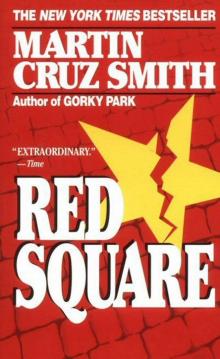 Red Square
Red Square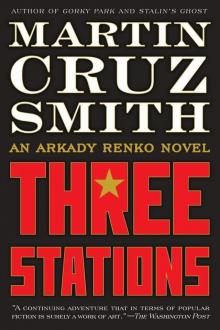 Three Stations
Three Stations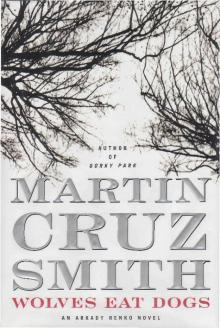 Wolves Eat Dogs
Wolves Eat Dogs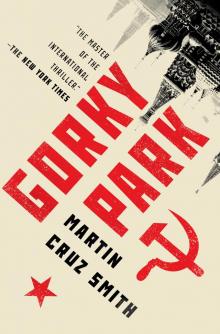 Gorky Park
Gorky Park December 6
December 6 Havana Bay
Havana Bay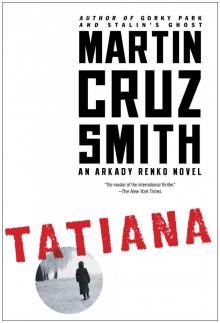 Tatiana
Tatiana The Girl From Venice
The Girl From Venice Stalin's Ghost
Stalin's Ghost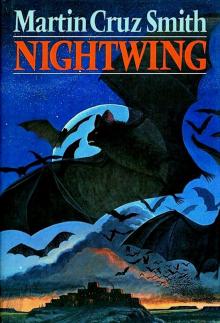 Nightwing
Nightwing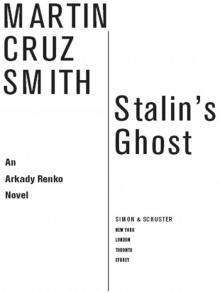 Stalin s Ghost
Stalin s Ghost Gypsy in Amber
Gypsy in Amber Rose
Rose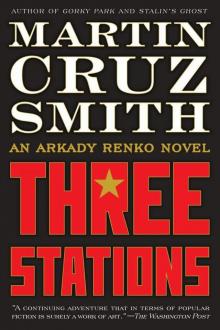 Three Stations: An Arkady Renko Novel
Three Stations: An Arkady Renko Novel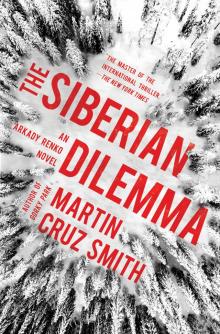 The Siberian Dilemma
The Siberian Dilemma December 6 (V5.0)
December 6 (V5.0)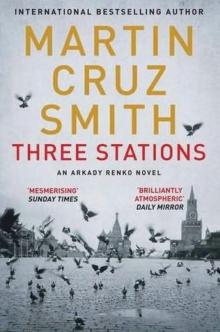 Three Stations ar-7
Three Stations ar-7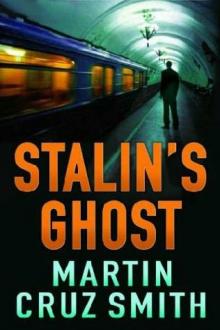 Stalin’s Ghost ar-6
Stalin’s Ghost ar-6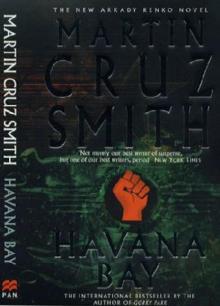 Havana Bay ar-4
Havana Bay ar-4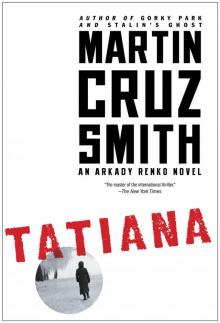 Tatiana ar-8
Tatiana ar-8